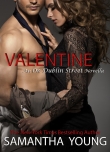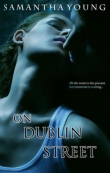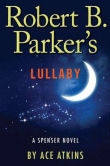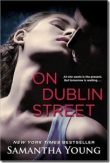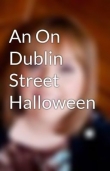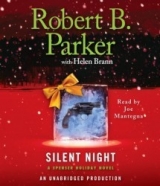
Текст книги "Silent Night"
Автор книги: Robert B. Parker
Соавторы: Helen Brann
Жанры:
Криминальные детективы
,сообщить о нарушении
Текущая страница: 1 (всего у книги 9 страниц)
THE SPENSER NOVELS
Robert B. Parker’s Wonderland
(by Ace Atkins)
Robert B. Parker’s Lullaby
(by Ace Atkins)
Sixkill
Painted Ladies
The Professional
Rough Weather
Now & Then
Hundred-Dollar Baby
School Days
Cold Service
Bad Business
Back Story
Widow’s Walk
Potshot
Hugger Mugger
Hush Money
Sudden Mischief
Small Vices
Chance
Thin Air
Walking Shadow
Paper Doll
Double Deuce
Pastime
Stardust
Playmates
Crimson Joy
Pale Kings and Princes
Taming a Sea-Horse
A Catskill Eagle
Valediction
The Widening Gyre
Ceremony
A Savage Place
Early Autumn
Looking for Rachel Wallace
The Judas Goat
Promised Land
Mortal Stakes
God Save the Child
The Godwulf Manuscript
THE JESSE STONE NOVELS
Robert B. Parker’s Damned If You Do
(by Michael Brandman)
Robert B. Parker’s Fool Me Twice
(by Michael Brandman)
Robert B. Parker’s Killing the Blues
(by Michael Brandman)
Split Image
Night and Day
Stranger in Paradise
High Profile
Sea Change
Stone Cold
Death in Paradise
Trouble in Paradise
Night Passage
THE SUNNY RANDALL NOVELS
Spare Change
Blue Screen
Melancholy Baby
Shrink Rap
Perish Twice
Family Honor
COLE/HITCH WESTERNS
Robert B. Parker’s Ironhorse
(by Robert Knott)
Blue-Eyed Devil
Brimstone
Resolution
Appaloosa
ALSO BY ROBERT B. PARKER
Double Play
Gunman’s Rhapsody
All Our Yesterdays
A Year at the Races
(with Joan H. Parker)
Perchance to Dream
Poodle Springs
(with Raymond Chandler)
Love and Glory
Wilderness
Three Weeks in Spring
(with Joan H. Parker)
Training with Weights
(with John R. Marsh)


G. P. PUTNAM’S SONS
Publishers Since 1838
Published by the Penguin Group
Penguin Group (USA) LLC
375 Hudson Street
New York, NY 10014

USA • Canada • UK • Ireland • Australia • New Zealand • India • South Africa • China
penguin.com
A Penguin Random House Company
Copyright © 2013 by The Estate of Robert B. Parker
Penguin supports copyright. Copyright fuels creativity, encourages diverse voices, promotes free speech, and creates a vibrant culture. Thank you for buying an authorized edition of this book and for complying with copyright laws by not reproducing, scanning, or distributing any part of it in any form without permission. You are supporting writers and allowing Penguin to continue to publish books for every reader.
Library of Congress Cataloging-in-Publication Data
Parker, Robert B., 1932–2010.
Silent night : a Spenser Holiday novel / Robert B. Parker with Helen Brann.
p. cm.—(A Spenser Holiday Novel)
ISBN 978-0-698-15515-2
1. Spenser (Fictitious character)—Fiction. 2. Private investigators—Massachusetts—Boston—Fiction. 3. Boston (Mass.)—Fiction. I. Brann, Helen. II. Title.
PS3566.A686S56 2013 2013028875
813'.54—dc23
This is a work of fiction. Names, characters, places, and incidents either are the product of the author’s imagination or are used fictitiously, and any resemblance to actual persons, living or dead, businesses, companies, events, or locales is entirely coincidental.
Joan:
Every Christmas gift I cherished came nicely wrapped as you.
CONTENTS
Also by Robert B. Parker
Title Page
Copyright
Dedication
Chapter 1
Chapter 2
Chapter 3
Chapter 4
Chapter 5
Chapter 6
Chapter 7
Chapter 8
Chapter 9
Chapter 10
Chapter 11
Chapter 12
Chapter 13
Chapter 14
Chapter 15
Chapter 16
Chapter 17
Chapter 18
Chapter 19
Chapter 20
Chapter 21
Chapter 22
Chapter 23
Chapter 24
Chapter 25
Chapter 26
Chapter 27
Chapter 28
Chapter 29
Chapter 30
Chapter 31
Author’s Note

SUSAN AND I WALKED from my place up to Newbury Street on a sunny Saturday morning. The snow from the night before had stopped falling. There wasn’t much traffic, mostly cabs and an occasional noisy snowplow. It was two weeks before Christmas. A Salvation Army worker in full uniform was ringing a bell beside a tripod bucket at the corner of Boylston and Berkeley.
“I’m glad we don’t exchange presents anymore,” I said.
“Me too,” Susan said. “Have you canceled your account at Victoria’s Secret?”
“Reluctantly. But they still send me the catalog.”
“You could probably have your name removed from the list,” Susan said.
“Sure.”
She smiled.
We went into a women’s boutique, where the staff seemed to know Susan. I found a chair designed for a woman who weighed 108 pounds. I resumed my lifelong comparative study of the female form. Susan had opened a nearly insurmountable lead. That was no reason not to see who might be runner-up. Or in the top ten. After about forty minutes we left. Susan had bought what she referred to as a “lovely little top.” And several small packages in a shopping bag decorated with a large Santa Claus.
“I didn’t think Jews did Christmas shopping,” I said.
“More often we do Christmas selling. You do realize there’s a group of us at Harvard who gather every year and drink wine and exchange one gift each.”
“Any men in this group?”
“No.”
“Sounds like a fun crowd. A gathering of Harvard women.”
“It can get a little fustian at times,” Susan said. “But I like these women, and there’s something sort of nice about a girls’ night out.”
“Sort of like Hawk and me at the fights?”
“Sort of.”
We turned the corner and into the bar door of the Taj Boston, formerly the Ritz, for a libation at the table we liked overlooking the Garden.
“I’ll have a glass of Edna Valley chardonnay,” Susan said to the waiter.
“Johnnie Walker Blue, soda, highball,” I said.
Susan smiled at me. “I like your Christmas spirit.”
“And I like yours.”
Susan sipped her wine. “Why do you suppose a grown woman, a doctor, a therapist at that, feels at Christmastime the same sense of excitement and anticipation she did when she was just a girl?”
“Perhaps we’ll need to discuss this later,” I said, lifting my glass.
“I do hope so,” Susan said, and raised her glass to me. “At length.”

I STOOD AT MY OFFICE WINDOW and looked out at the snow falling quietly onto the Back Bay and muffling the gleam of the Christmas lighting in the store windows. The snow had come often this year.
“Fa, la, la,” I said.
Pearl raised her head. She was with me on a take-your-dog-to-work day, which she spent, as she often did, on the couch in my office. I looked at her.
“La, la,” I said.
She didn’t know what I was talking about, but she was used to that. She could also sense that whatever it was, it had no connection to food. So she put her head back down on her paws and watched me in silent resignation.
I liked the myth elements of Christmas. The way in which its origins reach back far beyond Jesus, to the rituals of people unknown to us. The celebration of the winter solstice. The coming of light in the darkest time. And with it the promise of spring to come and beginning again. I liked it better than Rudolph the Red-Nosed Reindeer.
I went to my desk and sat down.
“Actually,” I said to Pearl, “I’ve had bad colds I liked better than Rudolph the Red-Nosed Reindeer.”
I sensed movement in her look. Then she lost interest and snapped her head toward the door and made a low growl. Hospitality dog.
The door opened and a kid came in.
He looked at Pearl and said, “That dog going to bite me?”
“Not,” I said, “unless you attack me.”
“Attack you?”
“Uh-huh.”
“For crissake, I’m a fucking kid.”
“I guessed that. Have a seat.”
Still watching Pearl, the kid sat down opposite my desk. His face was pointy and his eyes were close. He was wearing gray sweatpants that were too long for him. The bottoms of the pant legs were torn and ragged where the heel of his sneakers had repeatedly caught in them. His jacket was a threadbare navy peacoat, also too big, with the sleeves turned back. Under it was a gray hoodie. His baseball cap had a flat brim, and he wore it level and straight under the hood.
“How old are you?”
“Eleven, I think.”
“You think?”
“Yeah. I was there, but I don’t remember it, you know.”
“What about your parents? You know them?”
“My old lady was a drunk. I don’t think she knew who my old man was.”
“She the one who raised you?”
“Awhile,” the kid said. “Then she didn’t.”
“Run off?”
“Wherever she went, she went.”
“So who raised you?”
“The orphanage.”
“How was that?”
“Sucked,” the kid said. “You wanna hear why I come to see you?”
“I do.”
“I live in a place.”
“Where,” I said.
He made a looping gesture with his right hand.
“Around,” he said.
“Nice neighborhood.”
The kid frowned at me. He was so street-worn and tough-talking and life-weary that I forgot he was only eleven. Irony is not the long suit of eleven-year-olds.
“You don’t know where I live,” he said.
“No,” I said. “I was just making a little joke.”
“Ain’t funny.”
“No,” I said. “Probably not. What’s your name?”
“Slide.”
“Last name?”
“Slide,” he said.
I nodded.
“What do you want me to do for you?”
“I want you to talk with Jackie,” Slide said.
“Who’s Jackie?” I said.
“Jackie asked me to come here and deliver his message. He needs to see you.”
“What does he want to talk to me about?”
“He’ll tell you.”
“Why me?”
“He seen you on the TV.”
“Why didn’t Jackie come?” I said.
“He sent me. He wanted to know if you would see him,” Slide said.
“How long have you known Jackie?”
“A few weeks,” he said.
I nodded. “And before that?”
He shuffled uncomfortably in the chair. “Did odd jobs. Slept where I could. The Y. You know.”
“Uh-huh,” I said.
“Will you see Jackie?”
I took a card out of the middle drawer of my desk and gave it to him.
“You or Jackie call me when you’re ready,” I said.
“Okay,” he said.
The kid took the card and put it in the side pocket of his pants without looking at it. Then he stood up and looked at me and didn’t say anything and turned and went out.
I went to my window and watched him walk through the snow, his shoulders hunched, hands in his pockets, staying close to the walls of buildings, until he turned the corner onto Boylston Street and disappeared in the direction of the Public Garden.

WE WERE AT MY PLACE. I was making supper. Susan was at my kitchen counter. Pearl had stretched out the length of the sofa, longer than one would think possible for a seventy-five-pound dog.
“Tell me more about this boy who came to see you,” Susan said.
“His name is Slide, he’s eleven, and he lives with someone named Jackie in a place whose location is unknown.”
“That’s all?” she said.
I mixed bread crumbs and pignolis with a little olive oil and began to toast them in a fry pan on low.
“Except he’s terrified of his own shadow.” I stirred the contents of the pan, which were beginning to brown.
“And who is Jackie?” she said.
“Not much to go on,” I said.
I took the fry pan off the fire and emptied the toasted crumbs and pignolis into a bowl. I took an Amstel Light out of the refrigerator and opened it. I poured it into a tall glass. After a swallow, I said, “If you didn’t know, how old would you think you were?”
“Twenty-eight,” Susan said.
“Plausible,” I said. “But you’re far too smart to be only twenty-eight.”
“I try to conceal that.”
“You fail.”
“I wonder why Jackie sent a boy instead of coming himself,” Susan said. I watched her sip her wine. After an hour, the glass was still half full. “You’ll talk with Jackie?”
“If he gets in touch,” I said.
“What if it’s something illegal,” Susan said.
“There’s illegal and illegal,” I said. “I make part of my living from that fact.”
Susan nodded.
I turned up the heat under the pot of water on the stove and put some whole-wheat linguine in it and set my timer. I sat on a bar stool opposite Susan, who took another sip and said, “Let me see if I have this right. Slide is sent by this guy named Jackie, who may or may not ever appear. And although you don’t fully grasp the situation, something about Slide has got you interested in helping him, whether Jackie’s activities are legal or not.”
“Slide’s eleven going on thirty. So far life hasn’t been full of good times for him. He’s afraid. Somewhere along the line he got scared, real bad. Of who, or what?”
“And maybe Jackie is the key to figuring out what’s happening,” Susan said.
The timer went off and I went over and drained the linguine. “Whatever Jackie turns out to be, or whether or not he shows up, Slide is definitely in some kind of trouble.”
“Slide is a convenient cover for Jackie to hide whatever he’s up to,” Susan said. “And since he didn’t come himself, it would appear that at the very least Slide is being used.”
“A Boston version of Oliver Twist,” I said. I plated the pasta and brought the plates over to the counter.
“There wasn’t much Charles Dickens in our house,” Susan said.
“That’s because you spent your time reading the diaries of Sigmund Freud.” I picked up my fork. “A match made in heaven.”
“So deep down, we’re really just a couple of Victorians?” she said.
“Maybe not. Just that we were educated early in the analysis of motivation,” I said. “Dickens, Freud, they’re all alike in the dark.”
Susan laughed. “Mrs. Freud might disagree with you on that.”
It was quiet for a moment. Then Susan said, “Have you given any thought to how we should spend Christmas?”
“Only that we should be together.” I glanced over at the softly snoring Pearl. “With Pearl, of course. Hawk, too. Maybe ask Paul if he can join us.”
“We’ll do it at my place. You know how I love to set a nice table for Christmas.”
“A beautiful paradox,” I said. “But anywhere you are, it’s Christmas to me.”

THE NEXT MORNING I met Hawk at the Harbor Health Club. Hawk was doing combinations on the heavy bag and I was hitting the double-end jeeter bag with my left hand. Hawk didn’t break a sweat. After ten minutes I was sodden and winded.
“You do any more damage to that bag, we’ll have to get Henry a new one for Christmas,” I said.
“Fuck Christmas,” he said.
“Wow,” I said. “And people say you’re not sentimental. You still bitter that Santa Claus is a white man?”
Hawk began to hit the bag alternately with both hands.
“Whole holiday be a white man’s scam. All those rich honkies running in and out of stores like they might miss buying the last Rolls on the floor. Bentley’s beneath them.” He shifted his feet a little and started hitting the heavy bag with his left hand.
“This from a guy who drives a Jaguar,” I said. “I would think you’d appreciate a nice Rolls.”
“Jag be subtle elegance, babe. Rolls just someone tryin’ too hard to impress people who don’t know better. That’s Christmas.”
“Well, Ebenezer, you had better work on your holiday spirit, or Susan’s going to rescind her invitation to Christmas dinner.”
Hawk stopped, lightly tapped the bag with his left hand, and looked at me.
“Christmas dinner? At Susan’s?”
I nodded. “We could call it a Kwanzaa dinner, if that would improve your mood.”
Hawk ignored me. “Just the three of us?”
“And Pearl,” I said.
“How about Paul?”
Paul Giacomin had spent several Christmases with Susan and me in the years since I had helped liberate him from his parents.
“Susan called—Paul will be at his in-laws’ this Christmas. We may visit him in New York after the New Year.”
“So just us? And Pearl?”
I nodded. “Unless there’s someone special you’d like to invite.”
“No one special at the moment.” Hawk grinned. “’Course, it ain’t Christmas yet.”
“So can I let Susan know you’ll be cruising by in the Jag to join us?”
“Tell Susan I’m looking forward to it.”
“I can feel her blushing already,” I said.
Hawk went back to pummeling the heavy bag.
“Dinner better be at Susan’s house, though. Wouldn’t park my car in your neighborhood, even if it is just a Jag.”
After we wound down, we walked to the South Street Diner at Kneeland Street. Hawk ordered a coffee with skim milk and two Equals. No donut. I ordered a coffee and two corn muffins. Between the first and second muffin, I told him about Slide. “He’s the most terrified kid trying not to show it I’ve ever seen.”
“I knew a boy like that once,” Hawk said.
“You.” I said it without thinking, knowing I was right.
Hawk looked at me. To the world, Hawk appeared impassive and impenetrable. And mostly, he was. I had been around him long enough, though, that I could recognize subtle changes. Things most people didn’t see, or didn’t notice. But I knew Hawk—to the extent anyone could know him—better than most people did. And now it was Christmas, a time for revelations. Maybe Susan could explain it to me. Perhaps it was a vestige of our need to huddle by the cave fire together and tell stories, to ward off the darkness outside.
Hawk stirred his coffee. I watched the people come and go by the cash register, bundled up against the eighteen-degree weather.
“When I was about Slide’s age, I hit the streets. The winter was always the worst. I got money to eat any way I could.” Hawk looked at me. “Any way.”
“This kid is scared. I don’t see you being scared.”
Hawk took a sip of his coffee. He placed the cup back down on the saucer and leveled his gaze at me.
“All kids scared one time or other. You on your own, you learn how to take care of yourself.”
I nodded. “You survive long enough, you learn not to be afraid.”
“Or you don’t survive, and it don’t matter.”
Hawk drained the rest of his coffee, then counted out his tip.
“You have help?”
Hawk stood up and slid into his parka.
“Lotta help, ’long the way,” he said. He paused. “One day I meet a cocktail waitress and she help me grow up real fast. I was sixteen and she was twenty.” He grinned. “Haven’t been scared since.”

WHILE I WASN’T FEELING particularly holly jolly about Christmas, I was quite interested in Christmas dinner. Sometimes we went out, and sometimes we stayed home, where I cooked and Susan stayed out of the way. I had been pondering wild boar. While I toyed with the idea of hunting it myself, I opted for a more refined approach. I explored the exotic game at Savenor’s on Charles Street. Then I drove out to Newton to inspect the offerings at John Dewar. Just in case I encountered a wild boar on the way to the suburbs, I took my gun.
Maybe turducken . . .

WHEN I GOT BACK to my office, waiting outside the door was a smooth, strapping guy with a lot of dark curly hair and the open professional smile of a television star. He was wearing an ill-fitting blue blazer over a collarless black shirt and gray slacks. His clothes had the worn and rumpled look of a thrift store sale.
He smiled. “My name’s Jackie. I was wondering if I could talk with you.”
“Come in,” I said, and unlocked the door.
I motioned him into the office. He stood next to one of the guest chairs until I had made my way around the desk. I sat. He sat. I tented my hands, rested my chin on my fingertips, and waited. The room grew quiet enough for me to hear the traffic noise from the street below. The steam radiator hissed.
“First thing,” Jackie said finally. “My name is Joachim Lorenzo Alvarez.”
“You obviously know mine.”
“I do,” Jackie said.
“So you know my name and what I do,” I said.
“And you only know my name?” Jackie said.
“Exactly,” I said.
“How much has Slide told you?”
“Not much.”
“I run an organization called Street Business,” Jackie said. “I give kids a place to live. I get jobs for them.”
I waited.
“Street Business gives a home and work and structure to kids who need them,” Jackie said. “We provide an opportunity for runaways, those abandoned by their families or who are alone because of circumstances over which they have no control.”
“Excuse me, Jackie,” I said. “But you sound like you’re reading from a brochure. You help kids. I get that. Where do you find the kids you help?”
Jackie seemed to relax a bit. He took a deep breath and gave a slight wave of his left hand. “Mostly, the kids find me. Word-of-mouth referrals. One kid tells another, that kind of thing. Sometimes they just turn up on my doorstep, who knows from where? Especially when it’s cold out.” He smiled at me. “My brother Juan has a large estate in Weston, and he sometimes sends me the children of the Mexican immigrants who work for him. They need to earn pocket money and learn English. Others are referred to me by those who are aware of my services. Kids just out of juvenile detention. Nowhere to go. That sort of thing. Their parents have kicked them out.”
“Are you licensed?’
He looked down at his hands. “No,” he said. “Not at this time.”
I leaned back in my chair and contemplated what I was hearing. An unlicensed home for wayward kids. I considered the types of work a place like that would have kids do, and didn’t like any of them. And how would he avoid getting caught by the cops, running an unlicensed business? Probably not a client I’d be highlighting on my website. If I had a website.
“Where does your financing come from?” I said.
“We’ll take any help we can get. I take a percentage of what the kids make to help run the place, but it isn’t enough by a long shot. My older brother Juan is our main support.”
“Your brother has that kind of money?”
Jackie flashed a brief smile. “Please don’t let my stylish clothing fool you, Mr. Spenser. I am not a wealthy man, but my brother is. He is a successful businessman with many interests.”
“He’s in Boston?”
Jackie brightened. “Yes. His office is here in town, in the Financial District.”
“And why do you and your brother do this?”
“I started Street Business to help others avoid the mistakes I have made. My family came over from Puerto Rico and settled in Lawrence, where there’s a big immigrant community. Our mother still lives there. I am not proud of this, but I fell in with gangs early. Juan never did. He left Lawrence as soon as he graduated from high school, traveled to Mexico and South America, came back a businessman. He is generous with his wealth, in the community and with his family. He got me out of the gang life and gave me a job. And when I told him I wanted to start Street Business, he bought me the house we use and gave me enough funds to get started.”
“And when you run low, he helps you out?” I said.
“Yes.”
“And what do you do about the law? Does your brother help you out with the being-unlicensed part, too?”
“Yes,” Jackie said. “Juan has many friends in high places.”
“What kinds of jobs do the kids do?” I said.
“A couple of Juan’s guys live with us, and they help find them jobs. Bike messengers. Some are busboys. They can do the kinds of things in restaurants that aren’t unionized. In the summer they mow lawns, do yard work, that kind of thing. You’d be surprised. We have some good mechanics and apprentice carpenters. People don’t ask too many questions, if a sixteen-year-old kid is a good worker.”
“And some are messengers, like Slide,” I said.
Jackie gave a little laugh that sounded like a hiccup.
“Yes, like Slide. When I can keep him from running back to Carmen.”
“Who is Carmen?” I said.
“She’s Juan’s girlfriend. She lives on his estate out in Weston. Slide turned up out there a week or so ago. Carmen told me he looked like he had been hitchhiking for a while. His last ride must have dumped him off on the Weston highway. I guess he could see my brother’s big red barn from the road and decided to sleep there, where he could stay warm. She found him in the morning up in the hayloft. After a few days, Carmen sent him to me to see if he could be useful running errands. But he’s so attached to her, he keeps hopping a bus or hitchhiking back to Weston.”
“Maybe he just prefers fresh air over Times Square,” I said, “like on Green Acres.”
“What?” Jackie frowned.
“Nothing. So what problem do you have that you need me for?”
Jackie leaned forward and his voice dropped. “The property that Juan gave me? Where we both live and work? People are trying to make us get out.”
“By means that require me, not a lawyer?” I said.
“Yes.”
“And no cops?”
“That is correct,” Jackie said.
“Because you aren’t legal?”
“Yes,” Jackie said. “We are not strictly legal. We are, as you noted, unlicensed. Some of the kids are underage and don’t have any working papers. And some, as I mentioned, are illegal immigrants from Mexico.”
“Who’s trying to drive you out?”
“I’m not sure. It could be a street gang. Or the church. There is a local parish that is looking for property so they can expand. They want to build low-income housing and a school. Juan owns some other houses in the block where he puts his employees. At one time, the church wanted to buy us all out, but we wouldn’t sell. Whoever it is, they take the kids’ money and sometimes rough them up. A couple of the boys have been hurt, and plenty of them are frightened.”
“If your brother Juan is so rich, why can’t he find out who’s trying to get rid of you and then do something about it?” I said.
“Juan supports us financially, but he keeps his distance from Street Business. It could have a negative impact on his business and social interests in Boston.”
“And what exactly are Juan’s business interests?” I said.
Jackie smiled at me as though I should know. “My brother has a very successful import/export business with offices all over the world. Alvarez Worldwide Limited. Since I am not a businessman, I do not pretend to understand all the ins and outs of what he does, but I do know he is very rich and powerful. Most of his business is between Mexico and the States, and he travels a great deal between the two.”
“And what do you want me to do for you?”
“Find out who’s trying to get rid of us and make them stop.”
I nodded.
“Are you thinking about paying me?” I said.
“We will pay you what we can.”
“Were you thinking about when?” I said.
“We will pay you when we can,” he said.
“Gee,” I said, “do you have the same deal with the electric company?”
Jackie straightened in his chair and looked at me evenly.
“Mr. Spenser, it is not easy for me to ask for help. I am trying to do good in the community. I am being opposed by unknown forces that I cannot myself combat. I am told you are good at this. I am not. I tell you I will pay you what I can when I can. I am a man of my word, but that is the best I can offer. Will you help us, please?”
I leaned back in my chair and thought about my other cases. That didn’t take long. I had no other cases. Crime in Boston had apparently taken an early holiday. Then I thought about the earnest man sitting in front of me, pleading for my help. I thought about Slide, a frightened kid trying desperately not to show fear. And I tried to imagine Hawk when he was Slide’s age, living on the streets and learning to survive.
“Yes,” I said. “I will help you.”
After Jackie had gone, I phoned Hawk. I asked him to look into the background of Juan Alvarez and find out everything he could. I told him that I had agreed to help his younger brother, Jackie. I filled in the details and hoped for more to come.



